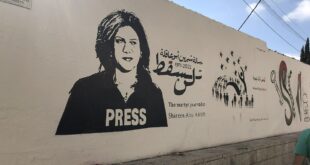Usually when I get to Qatar I check into a hotel and make my way over to Al Jazeera. Not this time around. This time, my first stop was the new Ritz Carleton, where I stayed there for the next couple days to attend a conference on development and democracy hosted by the Gulf Studies Center at Qatar University and organized by half-a-dozen think tanks, including the Council on Foreign Relations in New York, the Cairo-based Arab Organization for Human Rights, and the UK's Royal Institute of International Affairs, which put on the most impressive panel of those I attended. However, the panel that most clearly addressed my concerns as a senior editor of TBS was the one organized by the Council on Foreign Relations: "Shaping Public Opinion: The role of the Arab media," chaired by Judith Kipper, CFR director of Middle East Programs. There on the panel, and indeed one of the most effective of the panelists was Wadah Khanfar (another was Christopher Isham, chief of investigative projects, ABC News). Khanfar is Al Jazeera's relatively new managing director (see The Future of Al Jazeera in this issue), whose last assignment in the field before moving to Doha was running Al Jazeera's Baghdad bureau.
So even in a seminar room, sharing presentation time with representatives from Abu Dhabi TV, Al-Arabiya TV, and Radio Monte Carlo, not to mention M.C. Andrews, the director of the White House Office of Global Communication, Al-Jazeera maintained its dominant presence. Other panelists talked a bit defensively about how Arab media has tried to spread democracy, and the importance of separating news from commentary but it was Khanfar who put it most starkly - the issue for Khanfar was the absence of a real "Arab media school" (in the sense of an intellectual current) to encourage "loyalty to professional standards." Khanfar went on to call upon his fellow journalists (and he spoke with the moral authority of a field correspondent who only recently has entered the realm of management) to transcend "our own subjectivity and concentrate on reality. For instance, in the matter of Iraq, we want real objectivity in our reporting. In London we use to say that maybe objectivity defies definition - we understand sincerity, truth, lies - particularly since the enemies of the Arabs accuse us of not having it, but no matter what, we need to be more objective."
These themes seem to have resonated throughout the duration of my nearly two weeks in the Gulf - putting in time in the news rooms and executive offices at Al Jazeera, Al-Arabiya, CNBC Arabiya, Trans-Arabian Creative Communications (the leading public relations company in Saudi Arabia and the Gulf), to meet with some of E-Vision's middle management, to talk by phone with the CEO at Abu Dhabi TV, and to put in some quality time actually watching the television product that I rarely have time to look at back in Cairo at the Adham Center.
The undercurrent to this theme is a sense - again, amazingly diffused among the major Arab satellite news broadcasters operating from the Gulf - that it is time to take a second, more discriminating look at the more chaotic side to public affairs talk shows and get back to the basics of television journalism, i.e., field reporting, where a self-conscious effort at objectivity is of critical importance.
In part this may be all be healthy reaction to the respective excesses of Arab coverage of the Iraq War, on the one side, and the highly troubled occupation and American coverage on the other. But for Abd al-Rahman al- Rashid, who has just taken over the helm, as managing director of the multi-channel MEN operation (Al-Arabiya, MBC, and Channel Two) this concern should not be some sort of new ideological fashion. Rather, objectivity should come about almost organically as the by-product of professionalism, and it is professionalism, the need for it both in practice and in ethical understanding, that intrinsically establishes objectivity and acknowledges the existence of at least two sides to any controversial question.
It is interesting that both Khanfar and al-Rashid see training as of paramount importance in sharpening the Arab journalists' sense of and commitment to professionalism. Of course that's not the only reason why al-Rashid has been brought from London, where he played an extraordinary role as editor in chief of one of the Arab world's leading newspapers, Asharq al-Awsat, in providing space for detached news reporting and analysis that often went against the grain of "the Arab street."
His mission is very managerial: certainly he has been brought in because he is a highly professional journalist (and with a strong background in the production of television documentaries) but he also has a mandate from MBC/MRN's owners to improve income and provide good training.
One area which has been dramatically simultaneously enriched and dramatically eroded is television reporting on business-eroded in the sense that Dubai Business Channel (DBC), the sole all-news, all-business news broadcaster in the Arab world prior to July 2003 appears to be suffering more and more of a loss of focus. Once DBC was a predominantly English-language channel, a position that could have secured it a niche in competition with the new player on the block, the all-Arabic language CNBC Arabiya and the generally sound Arabic language business reporting coming from Al Jazeera and Al Arabiya. However, DBC has drifted to nearly 90 percent Arabic programming, with decreased focus, and provides increasing amounts of hard or general news stories, an area in which it simply cannot compete with Al Jazeera and Al-Arabiya. At the same time, this loss of focus has undermined its credibility as a business channel at a time when CNBC Arabiya is developing rapidly with its highly trained staff of business journalists (see Business Unusual in this issue).
But that lack of focus and professionalism is a malaise for the entire network of the state-owned and directed Dubai TV Group consisting of Dubai Satellite Channel, the mainly English-language Channel 33, and Dubai Sports, all of whom have a whiff - to a greater (Channel 33) or lesser (Dubai Satellite Channel) degree-of old-school Arab state bureaucratic television. This is particularly ludicrous when one considers how in every other aspect of life, be it Dubai Media City-now the booming regional base for Reuters and Associated Press, not to mention MEN, CNBC Arabiya and Sony Broadcast-or the adjacent complex of IT multinational companies, the various duty free zones, the flourishing shop-till-you-drop mall culture, the ease with which one navigates Dubai international airport and the recent policy extending lifetime residence permits to expatriates buying property in special development zones, Dubai has become a leader in cutting the Gordian knots of bad Arab governance.
But there is now hope even there with the creation by Crown Prince Mohammed (the moving spirit behind Dubai Media City) of the Dubai Media Corporation, which has taken over the broadcasting assets of Dubai TV. The recently appointed head of programming for all DMC channels is the quite professional broadcaster Ali Gaber who comes to Dubai via Lebanon's privately owned and financially successful satellite channel Future TV. This development should further propel the trend to professionalism.
Part of professionalism is to recognize that a sense of news value means recognizing major stories that are not necessarily the obvious political dramas of violence or at least confrontation - and that these other dimensions of social existence also have a bearing in properly assessing developments in any ongoing area of coverage. Certainly the coverage of the Third World has always been skewed by the lack of interest in those stories which were not the result of human or natural disasters. This unfortunate tendency has too often been mimicked by the Arab satellite news channels in their legitimate aversion to the reception line and cabinet meeting coverage that characterized state-owned Arab national television news.
As a side-effect of its broader understanding of business news, CNBC Arabiya is providing an alternative to this cult of catastrophe coverage. Precisely because CNBC Arabiya, in its coverage of Iraq, takes a look at daily life throughout the country-and not just at the sudden flash points like Falluja or Najaf-reporting on efforts to deal with the problems of health care, the reopening schools, the creation of a new banking system, as well as the reform of the public sector companies, CNBC Arabiya has provided its viewers with a much broader look at Iraq than that of the two major all-news channels, and the leading cadres of those two channels have no doubt taken note.
But perhaps the best in professionalism is yet to come. Soon there will be competition for the still floundering official Iraqi channel-now known as Al Iraqiyya-victim of the Coalition Provisional Authority's penchant for squandering one opportunity after another, and which, following the serial disasters of American management, is now relying on training by Lebanon's LBC Sat. Now, LBC is a brilliantly successful commercial channel when it comes to dancing and prancing girls, racy ads, and glocalized Reality TV shows such as Star Academy - but has never been anything much to speak about when it comes to news. Also, by the middle of May 2004, test transmissions of a new privately-owned Iraqi terrestrial channel, to be called Nahrein ("Two Rivers," in reference to the Tigris and the Euphrates) will have taken place.
The moving spirits behind this new venture are Naguib Sawaris, one of Egypt's most successful entrepreneurs, who will serve as chairman of the board (Sawaris is already deeply involved in the development of Iraq since his company Mobinil holds one of the three licensed mobile phone operations in Iraq) and Mohamed Gohar founder and managing director of Video Cairo. Gohar serves as CEO and also has a stake in the ownership of Nahrein. More than that, Gohar has the capacity to provide the core for a competitive channel with serious news capability since he has managed a cadre of journalists and broadcasting technicians in Baghdad for more than a decade, serving Video Cairo's many international TV news clients in the guise of Video Cairo Baghdad.
Although Nahrein will be a general or variety channel, like domestic BBC or the American networks, it will have a very strong news component given Gohar's life- long commitment to providing professional and highly competitive television news coverage from and to the Arab world. Sooner rather than later this channel will either go onto satellite or will clone its own more pan-Arab oriented all-news channel that will no doubt have a great impact upon the region, providing viewers with still more relief from the over-simplifications of the "Arab street." TBS.
 Arab Media & Society The Arab Media Hub
Arab Media & Society The Arab Media Hub




